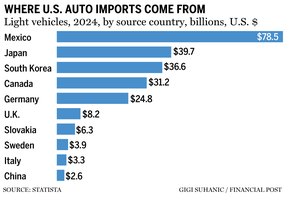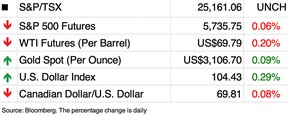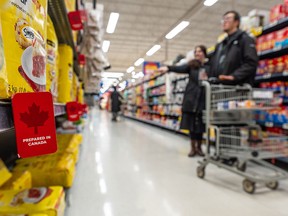Poll after poll shows angry Canadians are on board when it comes to hitting back, but some economists aren’t convinced
Article content

Article content
Article content
Poll after poll shows angry Canadians are on board when it comes to retaliating against United States President Donald Trump‘s tariffs.
So far, Canada has implemented 25 per cent retaliatory tariffs on a list of $60-billion worth of items ranging from candles to canes and alcohol to jewelry and gold.
But there are pros and cons to retaliating, according to Canadian economists and other experts. Here’s what four of them have to say.
Advertisement 2
Article content
Peter Morrow, University of Toronto
“You should probably be level-headed about what has actually been implemented and not get over our skis too much,” Peter Morrow, an associate professor at the University of Toronto’s economics department, said.
He said Canada has so far taken a very measured approach by not announcing pre-emptive retaliation, and he likened Ottawa’s approach to Mexico’s.
Morrow said policymakers always have choices, which include doing nothing, retaliating or implementing export taxes similar to what Ontario Premier Doug Ford wanted to do on electricity exports to the U.S. They can also seek out trade partnerships that have nothing to do with the U.S.
But with the outlook still quite murky, he is inclined to wait and see what happens.
“It seems like Doug Ford and Howard Lutnick (U.S. secretary of commerce) are having conversations,” he said. “I’m going to let myself be optimistic and hope that reason can prevail on some level.”
Advertisement 3
Article content
Derek Holt, Bank of Nova Scotia
In addition to the new retaliatory tariffs imposed by Canada on Thursday, Derek Holt, vice-president and head of capital markets economics at the Bank of Nova Scotia, has some other ideas.
For one, he thinks Ottawa should cancel its order for U.S.-built F-35 fighter jets. Liberal Leader Mark Carney has called for a review of the deal with Lockheed Martin Corp.
Furthermore, “don’t spend one further dime on U.S. military equipment in favour of European companies. Impose an import ban on Teslas and its parts. Tariff broader American autos,” he said in a note on Thursday.
Why is Holt so gung-ho on hitting back?
“You can’t win a trade war, but you can expedite its end by making the pain trade clearer in the other direction sooner and doing so can head off future trade wars,” he said. “Standing up to intimidation makes the agitator think twice about picking on you the next time versus some weaker kid. These are perspectives that I find tariff pacifists are not considering, especially in an election campaign during which leaders cannot appear to be weak before irate voters.”
Article content
Advertisement 4
Article content
William Robson, C.D. Howe Institute
“Trump makes us angry,” William Robson, chief executive of the C.D. Howe Institute think tank, said in a recent note. “U.S. protectionism may feel like a plague. But misguided retaliation will deepen tariff-related damage and spark demand for COVID-scale bailouts.”
He said tariffs “hurt the country” that imposes them because the increased levy raises the price of their imports.
Unlike the pandemic, which was a relatively short and sharp event, he said tariffs will be more “chronic.”
“We need responses we can live with for a long time,” he said.
Robson said “smart responses” won’t feed the need for revenge, but will make Canada stronger. They include reducing interprovincial trade barriers, establishing trade with other countries, lowering taxes and cutting regulation.
He also said Canada should break up the dairy “cartel” and allow more foreign competition in financial services, telecommunications and transportation.
Advertisement 5
Article content
But he isn’t entirely opposed to retaliation. He said targeted rebuttals in regions that are politically important to Trump could help.
“Our responses should make Canada stronger, more competitive and more prosperous,” he said. “Tit-for-tat will cost us at the checkout, on our pay stubs and at tax time. We have to be smarter than that.”
Werner Antweiler, University of British Columbia
“Retaliation is a double-edged sword: it hurts the opponent’s industry, but it also hurts our own industry,” Werner Antweiler, an associate professor and chair in international trade policy at the University of British Columbia, said. “Such a sword needs to be wielded with discretion.”
He said Canada needs to be strategic about tariffs and identify those areas that cause the most pain to the other side “without inflicting too much pain on our own side.”
Advertisement 6
Article content
That means identifying industries where Canada has plenty of homegrown supplies or can obtain them from other countries. Canada did just that in its initial $30-billion retaliatory round of tariffs by targeting areas such as agricultural products where Canada doesn’t rely on the U.S.
“Selectiveness is not just creating economic harm on the U.S. side, but it needs to be harm in the right place to actually send a strong message because that is the objective,” he said. “It’s not to harm the American industries, but it is basically making those industries speak up on our behalf.”
As Trump’s tariffs accumulate, Antweiler said Canada’s retaliatory choices will become more difficult, but they aren’t the only option. He said governments can look at procurement from other countries and also levy surcharges on, say, oil exports to make those products more expensive for Americans.
Advertisement 7
Article content
“We are highly exposed to international trade with the United States, so we have to respond,” he said. “You cannot just basically give in to demands from Trump because if you do, he will come back with more.”
Sign up here to get Posthaste delivered straight to your inbox.


Donald Trump’s threat to apply 25 per cent tariffs on imports of finished vehicles made outside of the United States is posing a nightmare up and down the automotive supply chain.
How the many parts that go into vehicle assembly would be affected by Trump’s tariffs raises complicated questions. If the materials come from the U.S., but get formed on a factory floor in Windsor, Ont., /return to the U.S. to be coated in paint or plated, only to come back to Canada to be installed in a vehicle, is that part made in Canada or the U.S.?
It’s a question that may only be answered over time as border officials and lawyers read the fine print and hash out a system, but the answer could affect global trade for years to come. — Gabriel Friedman, Financial Post
Advertisement 8
Article content
Read the full story here.

- Today’s Data: Statistics Canada releases GDP numbers for January. The U.S. Bureau of Economic Analysis releases data on the personal consumption expenditure index, a key measure of inflation for the Federal Reserve.
- Earnings: Aimia Inc.




It’s tax season, so it’s a good time for a cautionary tale about filing returns properly. This tale has to do with a taxpayer who claimed a charitable donation on her return even though it was arranged by her ex-spouse. Read Jamie Golombek to find out what happened in a tax case that took a decade to settle. Find out more here.
Advertisement 9
Article content
McLister on mortgages
Want to learn more about mortgages? Mortgage strategist Robert McLister’s Financial Post column can help navigate the complex sector, from the latest trends to financing opportunities you won’t want to miss. Plus check his mortgage rate page for Canada’s lowest national mortgage rates, updated daily.
Financial Post on YouTube
Visit the Financial Post’s YouTube channel for interviews with Canada’s leading experts in business, economics, housing, the energy sector and more.
Today’s Posthaste was written by Gigi Suhanic with additional reporting from Financial Post staff, The Canadian Press and Bloomberg.
Have a story idea, pitch, embargoed report, or a suggestion for this newsletter? Email us at posthaste@postmedia.com.
Recommended from Editorial
Bookmark our website and support our journalism: Don’t miss the business news you need to know — add financialpost.com to your bookmarks and sign up for our newsletters here
Article content
Is Canada’s tariff retaliation only way to beat back Donald Trump
2025-03-28 12:00:47




